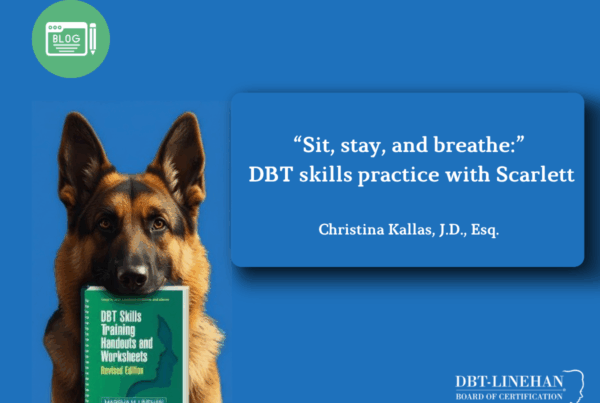See below for some strategies for obtaining treatment with a DBT-LBC Certified clinician or program covered by your insurance
We at the DBT-Linehan Board of Certification™ (DBT-LBC™) are committed to helping all individuals receive quality DBT services regardless of financial situation. We understand that the process of identifying high fidelity providers and programs who accept insurance can be an extremely difficult task, in the midst of what is already an incredibly overwhelming time. If you are unable to find an in-network provider and/or program or are struggling to assess whether a provider is actually qualified to provide DBT as designed and researched, we have created the following to help you in that process. There are clinicians and programs that provide quality DBT that may not be certified by DBT-LBC™, but those that have been certified by DBT-LBC™ have met certain high certification assessment standards and that often helps in getting your insurance company to agree to cover the treatment. If there are no DBT-LBC™ certified clinicians or programs within your physical vicinity, we encourage you to make sure that any clinicians who claim to provide DBT meet all of the other criteria stated in this document before proceeding with getting an SCA.
Often if a client is seeking specialized therapy and there is no provider or program in-network who offers it, they are entitled to receive the service out-of-network with the in-network copay/deductible.
Many clients have been able to get a “Single Case Exception” or a “Single Case Agreement” for DBT in order to go out-of-network and still only pay their normal in-network copay. The insurance company covers the remainder of the therapist’s normal full fee. This makes out-of-network therapy the same cost as in-network therapy for the subscriber.
Your insurance company may tell you that they have a specialist on their panel/in-network who can meet your needs. However, it is very unlikely in most situations, that you will actually be able to find a DBT-LBC™ certified clinician (or even a trained DBT therapist) or certified program who is in-network. What we suggest is that you call any therapist or program who your insurance company says provides in-network DBT and ask a few questions. Included here are some guidelines to help you determine whether or not the provider is actually offering comprehensive DBT.
Dialectical Behavior Therapy (DBT) consists of four components:
1. Weekly individual therapy with a DBT-trained clinician, (a minimum of 40 DBT specific hours of training from a reputable training provider) and preferably a DBT-LBC™ certified clinician or a clinician within the DBT-LBC™ certified program. The structure of each individual session should be created by a client’s recorded answers on a form called a “diary card” which is filled out daily.
The highest standard in assessment of DBT delivery is the DBT-Linehan Board of certification™. To confirm certification of your DBT provider or program by the DBT-Linehan Board of Certification™, go to the website of the DBT-Linehan Board of Certification™: https://dbt-lbc.org/index.php.
2. Weekly DBT skills training–usually conducted in a specialized group, but on rare occasion done individually in a separate session focused solely on skills training.
Adherent skills training requires that both teaching of new material AND a review of assigned weekly home-work is conducted. Research indicates that outcomes for clients are best if they complete 2 full cycles of the program’s skills training curriculum.
3. In between session phone coaching–needed to help the client use skills in daily life and avoid higher levels of care.
4. Clinician Consultation Team meeting–DBT requires that the therapist participate in a weekly consultation team meeting with only other DBT trained therapists.
***Note–in DBT continued participation in treatment requires that clients are improving on structured assessments like the diary card. This is different than many other treatments where clients stay longer in the therapy if they are NOT improving.
Without every one of the above components, it’s not DBT
It is worth asking the following specific questions to any providers that the insurance company has given to you to make sure that they are actually providing comprehensive DBT.
- Are you or your program certified by the DBT-LBC™?
- Do you provide DBT treatment?
- What was your training for providing DBT?
- Do you provide both the individual therapy component of DBT and the skills component?
- If so, is the skills training offered in a group setting and how long does group last each week?
- How long does your program take to complete 1 cycle of skills training?
- Do you allow a client/family to complete the skills training curriculum 2 times?
- Is continued participation in your DBT services based on some type of ongoing assessment of symptom improvement?
- Do you provide phone coaching between sessions as needed? Are there any limits placed on phone calls or between session contacts?
- Do you belong to a consultation team that meets weekly and includes only other DBT trained therapists?
- Do you use a daily diary card?
- What adaptations have you made to the research supported methods of providing DBT? Why were those adaptations necessary?
Very often when clients ask “DBT in-network” clinicians the above questions they have found that the clinician:
• Does not do DBT and does not claim to do DBT
• Has minimal training in DBT, incorporates a few DBT skills into non-DBT therapy, but does not claim to be a DBT therapist.
• Claims to “do DBT” but, in fact, has minimal training, doesn’t separate out the skills component of DBT from the individual therapy session, does not offer all 4 components of DBT, does not offer research supported methods for meeting the 4 required components, and/or is not part of a DBT therapist consultation team.
If you find that the therapists or program whose names you have been given by your insurance company are not DBT therapists, go back to your insurance company and ask for them to authorize out-of-network treatment under a single case exception or single case agreement. Some states actually have laws that will help support you in these requests. Our clients tell us that they are most successful when they appeal and act assertively. Do not expect to get an immediate “yes” or approval for your request. It may take going up the chain a bit to find someone who is familiar with DBT.
Here is a possible script for you to use when calling your insurance:
First say, “I would like to request a Single Case Agreement/Exception to see an Out-of-Network provider and/or program who is certified by Dialectical Behavior Therapy-Linehan Board of Certification™ (or specializes in Dialectical Behavior Therapy).” (It is best to say the whole name of Dialectical Behavior Therapy instead of DBT because insurance companies often think people are saying CBT).
Second say, “I have tried to find a Dialectical Behavior Therapy- Linehan Board of Certification™ program/clinician who is in-network with (name of insurance plan) and have not found any. I cannot afford to see an out-of-network provider without a single case agreement because I do not have out of network benefits/I have out of network benefits with a high deductible and co-insurance.”
This may be the point where the insurance company gives you names of providers in-network who “do DBT.” You will then need to call those names and ask the questions that were discussed above to assess whether they really are trained DBT clinicians providing DBT therapy. After you call the names given to you and you do not find a DBT clinician in-network, call the insurance company back and continue with the following:
Third say, “I have called the clinicians and programs that you provided to me on (say the date of your initial call) and upon speaking with them discovered that they are not certified by DBT-Linehan Board of Certification™ or trained in Dialectical Behavior Therapy and/or do not follow the researched and evidence based model of Dialectical Behavior Therapy in their practices.”
Fourth say, “Through my own research I found a clinician and/or program who is certified by the DBT-Linehan Board of Certification™. I have asked if (name of clinician referred to in previous statement) will consider a single case agreement and they have said yes. What is the next step I need to take?”
Once you start the process for getting a single case agreement/exception you may be asked by the insurance company to “justify” why you need this specialized treatment in order for them to agree to cover it. Many insurance companies will require that you have the symptoms or behaviors associated with Borderline Personality Disorder, emotional dysregulation and/or behavioral dysregulation (e.g. self-harm, suicidal behavior and thoughts, psychiatric hospitalizations, etc.). That is because DBT has been shown by research to reduce these issues and reduce the need for other higher levels of care (e.g. partial hospital). As a result, DBT is a therapy shown to reduce overall expenses for the insurance companies in the long-term. This cost reduction has been confirmed by research on
ADHERENT DBT PROGRAMS ONLY that deliver all four components discussed above in a manner that is consistent with the design and research of the treatment.
Many insurance company representatives are not familiar with different types of therapies and do not know the difference between them. If you are running into roadblocks with a particular insurance company representative it may help to say the following, “Is there a representative or supervisor I can speak with who has specific experience and knowledge of Dialectical Behavior Therapy?” It is common that once a person knowledgeable about the treatment modality becomes part of the process that things start moving along more smoothly.
Please know that the process of getting an SCA differs widely between states and from insurance company to insurance company. If you are having difficulties or have questions after trying these steps, please ask a DBT-LBC™ Certified provider in your state or contact DBT-LBC™ for assistance in identifying a provider who might be able to answer your questions.
The legislative committee of the DBT-LBC™ would like to share our greatest appreciation for those organizations and clinicians who have gone before us in helping to support patients and their families in getting Single Case Agreements for DBT! These include Emotions Matter Inc. https://emotionsmatterbpd.org/resources2 and their publication “Utilizing Single Case Agreements to Access Treatment for Borderline Personality Disorder: A Strategy to Support Health Care Consumers and Clinicians” (2017), and Judi Sprei, PhD, Britt Rathbone, LCSW-C, Brian Corrado, PsyD of the DBT Metro Consortium www.dbtmetro.com





